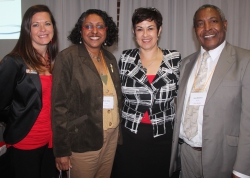
Hesscon - Skills Development under the spotlight.Rom left:Natasha McAllister,Dr Julie Reddy,Sharon van den Heever,Bruce Mohammed RSS Hesscon - Skills Development under the spotlight2016-09-20 The KwaZulu-Natal branch of the Association for Skills Development in South Africa (ASDSA) held a well attended and successful conference accompanied by a high tea on the 16 September 2016 at the Westville Country Club.
The conference, which attracted delegates from around the country, included training providers, skills development practitioners, business owners and employees as well as representatives from various sector education and training authorities (SETAs). The range of speakers provided much insight into current best practice and legislation impacting on businesses and service providers in the skills development arena. The overall theme of the day was the emphasis of the need to go beyond mere paper compliance with legislation that impacts on employees in the workplace. To avoid negative or possibly costly consequences, appropriate and meaningful action needs to occur. Opening the conference, the KZN ASDSA chairperson, Sharon van den Heever stressed the role of ASDSA as a representative body that supports skills development practitioners to fulfill their various responsibilities. In addition, ASDSA provides a platform for skills development facilitators to obtain a professional designation, which will allow greater credibility for service providers when interacting with all stakeholders. Bryan van den Heever from Hesscon provided an engaging and informative session on the importance of compliance with the Occupational Health and Safety (OHS) Act in a training environment. He said, "Too often safety and compliance ends at a safety file without due regard to the responsibilities of both employers and employees." He added that greater attention needs to be paid to the selection and training of appropriate people within the organisation who are physically fit and have the appropriate character traits to manage an emergency situation. Representatives of the Department of Labour, Pabala Khotle, assistant director ' Inspection and Enforcement and Sunil Sewpersad ' Labour Law compliance inspector, presented on the topic of employment equity compliance. Khotle said that the importance of transformation in the South African workplace is ongoing and employment equity is an essential part of the process. Sewpersad said, "Any discrimination that occurs in the workplace needs to be fair." He added that there is a need to ensure that skills development and employment equity are treated as separate issues within an organisation. The common practice of combining skills development and employment equity in a single committee and combined meetings is not acceptable. Key points for compliance with employment equity legislation are: The appointment of an employment equity manager, nomination of appropriate employee representatives by employees, development of an employment equity plan, monitoring, and reporting on its implementation progress. Bruce Mohammed of the Quality Council for Trades and Occupations (QCTO) presented on the role of the QCTO in relation to the SETAs. The QCTO is one of three quality councils in South Africa and is responsible for certification of occupational qualifications, the quality assurance of occupational standards and qualifications, and learning in and for the workplace. Mohammed emphasised that all training providers have the responsibility to provide a quality service to learners. The accreditation of training providers should not only be on the basis of a paper evaluation but the required competency to both train and assess learners should be appraised. In this regard Mohammed emphasized the difference between teaching and learning and that it is important to question whether or not real learning with demonstrable outcomes can be observed before a certificate of competency is awarded. Dr Julie Reddy, deputy CEO of the South African Qualifications Authority, presented on the topic of SAQA's roles in relation to qualifications registered on the National Qualifications Framework (NQF) and in relation to international qualifications. SAQA has an oversight role in assessing whether or not qualifications obtained are genuine and that they have been obtained from a registered education facility both in South Africa and internationally. SAQA performs an evaluation of any foreign qualifications awarded to persons both by South Africans and by foreigners requiring recognition for such qualifications by assessing how the international qualifications compare against South African standards and levels. The process includes an investigation into whether or not an education facility exists and whether or not it is recognised in that country as a registered educational institute able to confer such a qualification. In conclusion, South African Revenue Services representative Amanda Ngcobo informed delegates that with no instruction to the contrary, rebates for learnerships are here to stay unchanged until further notification - much to the relief of all delegates. For more information or to get involved http://www.asdsa.org.za/ Prepared by Gayle Adlam gayle@bafundise.co.za 031 2671977/ 0836530465 |
Hesscon - Skills Development under the spotlight
Copyright © 2024 KwaZulu-Natal Top Business